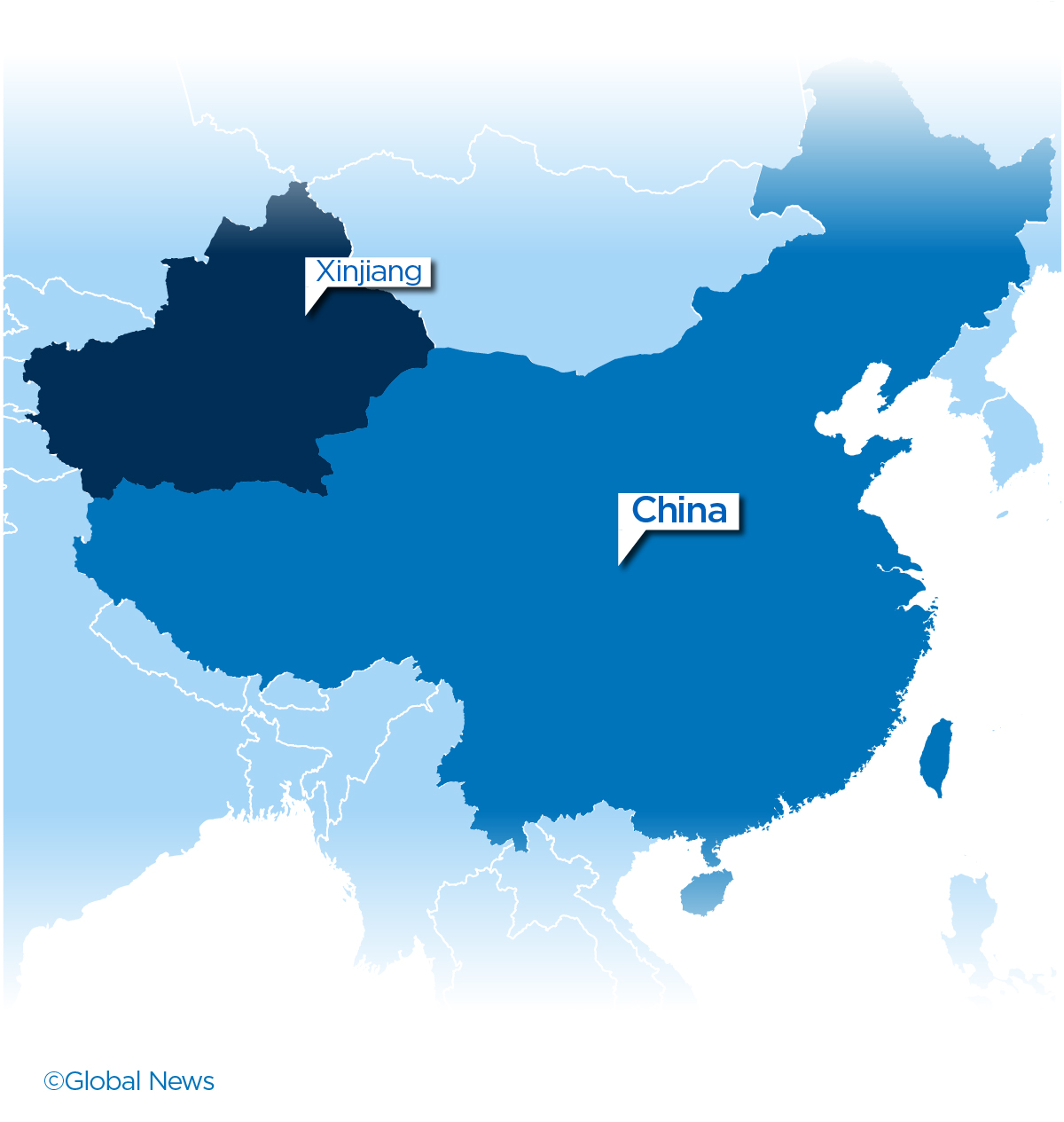For many Canadians, the most difficult part of self-isolation during the COVID-19 crisis is being away from loved ones.

For the majority of the population, that will end once the pandemic subsides.
But for members of the Uighur diaspora living in Canada, not having any contact with their family and friends back home in China, and worrying about family members who have disappeared, is an everyday reality with no end in sight.
LISTEN: Uighur exile in Canada shares COVID-19 fears
“It’s really hard when you are out of your home town and you are alone, plus you can’t have any contact… it’s really hard,” said Grace, a Uighur who has been living in exile in Canada for nearly four years.
Global News has agreed to conceal her name to protect her identity. She fears retaliation for speaking out about China’s widely documented persecution of Uighurs, an ethnic Muslim minority group in the semi-autonomous northwestern province of Xinjiang.
“Physically and emotionally, I am down. I don’t know how I am going to pass these days,” she said, describing how several months have passed since she last spoke with her husband. Global News has also agreed to protect his name out of concern for his safety.
She remembers telling him to stock up on groceries, as the novel coronavirus emerged in China’s Hubei province and began to spread across the country.
She regrets not having had the chance to say, “I love you.”
“He disappeared,” she said. “I tried to FaceTime him but he didn’t reply. I called his mobile but his mobile was turned off. I just felt there was something wrong with him.”

Grace believes her husband has been imprisoned in one of the Chinese government’s mass detention camps.

Get daily National news
Beijing refers to these facilities as reeducation centres, describing the operation as a highly successful de-radicalization program for Muslims.
‘Massive human rights abuse’
Dr. Charles Burton, a senior fellow at the Macdonald-Laurier Institute and former Canadian diplomat who served in China, says what’s happening to the Uighurs and other Muslims minorities in China, is a cultural genocide.
“The situation is grave and probably the most concerning massive human rights abuse going on in the world today,” he told Global News.
Burton said wearing a veil, growing a beard, having a family member living abroad or reading the Qur’an is enough to have a Uighur imprisoned in what he refers to as a “concentration camp.”
Recently leaked Chinese government documents from 2017, reveal a network of camps where as many as one million Uighurs have detained over the past three years.

It’s considered the most damning evidence of what former detainees have been claiming for years.
An investigation by the International Consortium of Investigative Journalists (ICIJ) recently exposed what’s known as the Telegram — a ‘how-to manual’ on how to detain and brainwash Uighurs.
It reveals a brutal reality: dormitories with double locks, constant surveillance, indoctrination and a mandate to prevent escapes.
The documents state students can earn credit for so-called ideological transformation, while detailing how inmates can be detained indefinitely.
In November 2019, the Chinese ambassador to the United Kingdom was questioned about the leaked documents during a press conference:
His reply: “Don’t listen to fake news. Don’t listen to fabrications.”
The Chinese government strongly denied the very existence of the camps until satellite imagery surfaced in 2017 and the country came under intense international pressure.
Canada has condemned the mass detention camps and surveillance of Uighurs in China and abroad.
Canada called on China to release all Uighurs “arbitrarily detained in Xinjiang” at the United Nations Human Rights Council twice in 2018 and also in March 2019.

Beijing has countered all of this by launching a propaganda campaign portraying the camps as humane job training centres.
“After they have been considered to be sufficiently reeducated or brainwashed as we would put it, they are often sent to work in the interior of China in restricted facilities where they still don’t have freedom to practice their religion,” said Burton.
According to a March 2020 report by the Australian Strategic Policy Institute, China has been accused of forcing Uighur Muslims to work at factories that produce goods for big names such as Apple, Nike, Sony, and Samsung among other global companies.
Fears of COVID-19 and the health of detainees
The situation is alarming enough, but a growing source of anxiety for Grace is the possibility COIVD-19 has spread to the mass detention camps.
“That’s the main thing I am very worried about,” said Grace.
Burton said crowded conditions inside the mass camps make it ideal for the spread of viral transmissions like COVID-19. That’s on top of psychological stress, interrogation and poor nutrition, he said.
According to Chinese media, a spokesperson for Xinjiang region’s government — Elijan Anayit — strongly condemned reports from Uighurs in exile of the possible spread of the novel coronavirus at mass detention camps.

Anayit, according to local media in China, called the reports “fabricated slanders” and “attacks” in March 2020.
Burton said a lack of international outcry and support further alienates people like Grace and her husband.
Grace said the whole world is keeping silent, “even they see human rights, humanity being destroyed but they are not speaking out.”
In the meantime, half a world away from Xinjiang, Grace transforms her pain into hope, holding onto a tiny bit of optimism that she’ll finally hear from her husband again, and that he and other detained Uighurs will one day be released.










Comments